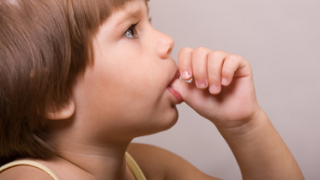Dental care does not just start when we’re knowledgeable enough to know what not to do to our pearly whites. In fact, dental care starts as toddlers, which is why it’s important for a person no matter the age to come visit the local dentist. One of the most detrimental activities a child can do to their oral health at an early age can be developing the habit of thumb-sucking. Thumb-sucking in children is very normal; however, it can be a hard habit to break. This habit can also result in harm to a person’s oral health. At Coventry Dental, we strive to give you the advice you need for a positive dental care experience.
Thumb-sucking is often viewed as a natural habit for children. Sucking on fingers, thumbs, pacifiers or any other objects can, in the early months of a baby’s life, make a child feel happy and secure. It can help a child learn more about their world. Children also suck to soothe themselves and/or to fall asleep. However, if this behaviour continues, it can have adverse results for your child’s teeth as well as the mouth development.
EFFECTS ON YOUR CHILD’S TEETH
Once a child’s permanent teeth develop, thumb-sucking can damage the way his or her mouth grows and alter the roof of their mouth. The extent or kind of damage caused by thumb-sucking is based on the power your child uses to suck, which differs from child to child. If a child uses thumb-sucking as a security tool, they are likely not sucking vigorously on their thumb. When a child thumb-sucks because they are upset, it is usually an aggressive suck. The damage to teeth, gums, and jaws varies with both the time and intensity of thumb-sucking habit.
WHEN DOES IT USUALLY STOP
Most children stop thumb-sucking when they reach the age of two to four (or when permanent teeth start to form). Usually, the incentive to stop is peer perceptions. Once the child starts to socialize with their peers, the thumb-sucking habit wanes. If not, it is vital to help your child quit sucking their thumb as early as possible. Children who often suck their thumb – especially after their permanent teeth start to develop – will push teeth into crooked positions and potentially create an underbite or overbite, which later requires braces or other more aggressive orthodontic treatment.
HELP YOUR CHILD STOP THUMB-SUCKING
- Shower praise on your child for staying clear of the sucking habit.
- Explain to your child why it is important not to thumb-suck and think of ways to reward him/her. Treats are a good idea as long as they aren’t tooth-harming sweets.
- Get stickers for your child. Help them participate in distracting activities (sports, dance, etc.) that can help keep them occupied.
- Focus on addressing any causes for your child’s anxiety and provide comfort to him or her.
For help stopping your child’s thumb-sucking or for an assessment of your child’s mouth, contact us at 519-305-9100 to book an appointment.

